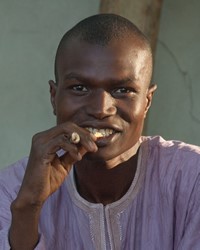Giziga, South in Cameroon

Photo Source:
Copyrighted © 2026
Michal Szymanski - Shutterstock All rights reserved. Used with permission |
Send Joshua Project a map of this people group.
|
| People Name: | Giziga, South |
| Country: | Cameroon |
| 10/40 Window: | No |
| Population: | 154,000 |
| World Population: | 154,000 |
| Primary Language: | Giziga |
| Primary Religion: | Ethnic Religions |
| Christian Adherents: | 5.00 % |
| Evangelicals: | 1.30 % |
| Scripture: | Complete Bible |
| Ministry Resources: | Yes |
| Jesus Film: | Yes |
| Audio Recordings: | Yes |
| People Cluster: | Chadic |
| Affinity Bloc: | Sub-Saharan Peoples |
| Progress Level: |
|
Introduction / History
Kirdi (meaning "pagan") is a broad, collective name for several people groups living in northern Cameroon, southeastern Nigeria, and southwestern Chad. At one time, all these groups were completely animistic. Today, some have become Muslim and wear traditional Islamic dress. There are several Kirdi groups, one of which is the South Giziga people in Cameroon.
What Are Their Lives Like?
Most of the South Giziga are farmers who raise crops on hillside terraces. Peanuts, maize and millet are among the main crops. They also raise melons, pumpkins, and beans. Millet and other cereals are usually grown on the mountains or hill slopes, while other crops are raised in gardens near the houses. Cotton, indigo (used for dyeing), and plants that are used for hunting, religious medicines, and other purposes are also grown.
A Giziga man's work includes crafting leather, making baskets, spinning, weaving, and building. Women make clay objects, train the small children, prepare the meals, and do other household activities. A woman may also raise her own crops on a small plot of land. The profits earned from selling these crops belong to the woman. Children take care of the small animals and help their older siblings or parents do other household chores.
Traditionally, South Giziga houses were grouped into small village settlements by clan or lineage. The villages were clustered around mountain peaks that could not easily be accessed by outsiders. They were protected by mud-brick barriers that had been overgrown by thorn bushes. Today, their villages are composed of several round buildings made of mud brick and thatched roofs. The buildings are connected to one another by woven straw fences or hedges. The buildings are positioned so that there is an open area in the center. Each home has a kitchen, an attic, and a room for the husband; the wife lives in a separate hut. Separate rooms are added to the house when the children reach puberty. Young males are given their own square huts, where they live until they are married.
Although polygamy is permitted among the South Giziga, most men usually have only one wife. Marriages are almost always arranged by the parents; children do not choose their own mates. When they make an agreement, there is payment of a bride-price to the bride's parents and a new homestead begins.
The Giziga culture contains various arts such as vocal and instrumental music. These instruments are played during festivals and at special ceremonies. The Kirdi do not pray to this god, but rather to their ancestors, whom they believe will intercede on their behalf. Beliefs about this creator god might be a bridge to biblical truth.
What Are Their Beliefs?
Most South Giziga believe in a single god who is the creator of all things and who keeps his creation in order. They believe that this god only intervenes with his creation when order has been disturbed. The Giziga do not pray to this god, but rather to their ancestors, whom they believe will intercede on their behalf.
Each South Giziga clan has its own "therapist-diviner" or medicine man. He benefits the community by supplying various medicines. He also serves as a mediator between the people and the spirits and performs minor surgical operations. The medicine man is paid with modest gifts from the villagers. The Giziga believe that the Earth is the "mother goddess" who has birthed all other "supernatural" beings, including thunder and lightning, black snakes, crocodiles, and certain inanimate objects.
What Are Their Needs?
The South Giziga people need to put all their faith in Jesus Christ, the only one who can provide them with abundant life.
Prayer Points
Pray for an abundant harvest among the South Giziga people in Cameroon as a testimony of God's goodness and power.
Pray for South Giziga people to have access to all gospel materials and the spiritual hunger to take these resources seriously.
Pray for South Giziga leaders to recognize the needs of their community for Jesus Christ.
Pray for a movement to Christ among the South Giziga people.